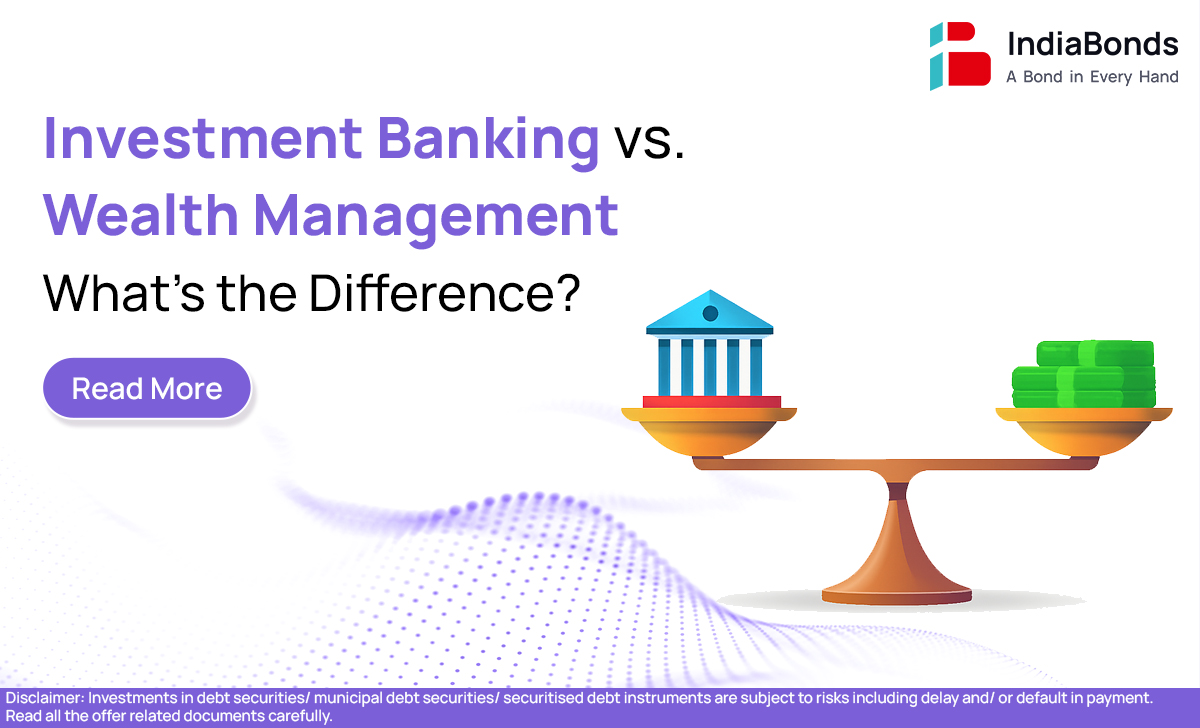Investment Banking vs. Wealth Management: What’s the Difference?

Introduction
Both investment banking and wealth management work with money, but they serve different needs. One serves companies that want to raise big amounts or buy and sell businesses. The other serves people and families who want steady growth, safety, and a plan for life goals. Knowing the difference saves time and helps anyone reach the right door on day one.
Investment Banking
Investment banking helps companies and large institutions get capital and complete complex transactions. The work includes preparing public offers on Indian exchanges, arranging big loans or bonds, and advising on mergers and acquisitions. Teams study a company, build financial models, talk to large investors, and set fair prices. They coordinate with regulators such as SEBI and with stock exchanges. The focus is on one clear outcome. Capital must be raised at the right cost or a deal must close with clean terms. Success is measured by execution quality, speed, and the value created for the company.
Typical services are capital raising through equity and debt, advice on buying or selling businesses, restructuring of balance sheets, and research on sectors. The time horizon is usually short to medium. A transaction may run for a few months, but the impact can shape the next several years of a company.
Wealth Management
Wealth management helps individuals and families build and protect personal wealth. The work begins with a simple plan. Goals are listed, such as education, a home, or retirement. The adviser then creates an asset mix using mutual funds, bonds, deposits, insurance, and where suitable direct equities or portfolio services. Tax rules are considered so that returns are not wasted. The plan is reviewed often and adjusted when life changes.
The focus is on discipline and behaviour. Markets will rise and fall, so a good wealth plan uses diversification and the right level of risk for the client. Success is measured by progress toward goals, not by one big win. Reports are shared in plain language so the client always knows where the money sits and why.
Relationship Managers and Investment Professionals
In wealth management the key person is the relationship manager. This person listens, explains products, and keeps the plan on track. Behind the manager are research teams that compare funds and check risks. In investment banking the team is built around analysts, associates, and senior bankers who design deals. They write information documents, run valuations, speak with investors, and negotiate. One function is ongoing and advisory in nature. The other is project based and transaction heavy.
Special Considerations
Choosing the right service depends on who the client is. A company with growth plans should speak to investment bankers. A professional or family with savings should speak to a wealth adviser. Fees also differ. Investment banking fees are linked to successful completion of a transaction. Wealth management fees can be a flat advisory fee or a percentage of assets, and good firms disclose all costs in writing.
Risk is another point. Investment banking works with deal risk such as market conditions and regulatory timelines. Wealth management works with market risk, interest rate changes, and the client’s own behaviour. Clear documentation, regular reviews, and simple products reduce most issues in both fields.
Importance of Talent and Skills
Investment banking needs strong financial modelling, valuation, negotiation, and knowledge of regulations. Clear writing and data accuracy are essential because investors and regulators rely on these documents. Wealth management needs listening skills, goal planning, tax understanding, and patient coaching. The adviser must translate complex terms into simple steps the client can follow. In both areas ethics matters most. Money moves only when trust is high, and trust grows from transparent communication and consistent action.
FAQ
What is better, wealth management or investment banking?
Better depends on the need. Companies that want to raise funds or complete mergers should choose investment banking. Individuals and families that want a long term plan for savings and protection should choose wealth management. The two services solve different problems.
Does wealth management fall under investment banking?
No. They are separate lines. Some large financial groups offer both, but the teams, clients, and goals are different. Investment banking is for corporate transactions. Wealth management is for personal finance.
What pays more, IB or PE?
Pay varies by firm and by year. Private equity pay can be higher at senior levels because it links to profits on investments. Investment banking also pays well, especially in strong deal years. Skill fit and long term interest should guide the career choice more than pay alone.
Can I go from wealth management to investment banking?
It is possible with preparation. A professional can learn valuation, corporate finance, and advanced modelling, work on live projects, and then move into a deal team. The reverse move is also possible for those who prefer client planning and long relationships.
Disclaimer : Investments in debt securities/ municipal debt securities/ securitised debt instruments are subject to risks including delay and/ or default in payment. Read all the offer related documents carefully.


















